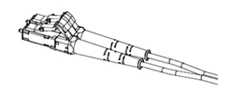In the realm of fiber optic networking, understanding the various components and their roles is essential for ensuring optimal performance and reliability. Two critical elements are the LC Stecker LWL connectors and LWL patchkabel (fiber optic patch cables). This article will delve into what these components are, why they matter, their advantages, disadvantages, and provide a conclusion to help guide your decision-making process.
What are LC Stecker LWL Connectors?
LC Stecker LWL connectors, or simply LC connectors, are a type of fiber optic connector known for their small form factor. "Stecker" means "connector" in German, and "LWL" stands for "Lichtwellenleiter," which translates to "fiber optic." LC connectors are widely used in high-density environments such as data centers and telecommunications due to their compact size. These connectors typically feature a 1.25 mm ferrule, half the size of SC connectors, making them suitable for installations where space is limited.
What are LWL Patchkabel (Fiber Optic Patch Cables)?
LWL patchkabel, or fiber optic patch cables, are essential for connecting different network devices. These cables consist of a fiber optic core, cladding, buffer coating, and an outer protective jacket. Patch cables come with various connectors, such as LC, SC, and ST, on both ends. They are crucial for establishing physical connections between network hardware like switches, routers, and servers, ensuring efficient data transmission within a network.
Why are LC Stecker LWL Connectors and LWL Patchkabel Important?
The importance of LC connectors and fiber optic patch cables lies in their ability to facilitate high-speed, reliable data transmission. Here’s why they are critical:
1. High-Density Networking: LC connectors are designed to maximize space utilization, which is essential in environments with limited physical space.
2. Ease of Connectivity: Fiber optic patch cables make it straightforward to connect various network devices, simplifying setup and maintenance.
3. Enhanced Performance: Both LC connectors and patch cables are engineered to deliver high performance with minimal signal loss, supporting robust and efficient networks.
Advantages of LC Stecker LWL Connectors
1. Compact Design: The small size of LC connectors allows for greater port density, crucial for modern data centers and telecom applications.
2. High Precision: LC connectors provide low insertion loss and high return loss, ensuring excellent signal quality.
3. Versatility: Suitable for both single mode and multimode fibers, LC connectors can be used in various networking scenarios.
4. User-Friendly: Easy to install and terminate, LC connectors reduce installation time and costs.
Disadvantages of LC Stecker LWL Connectors
1. Fragility: The small size of LC connectors makes them more delicate and prone to damage compared to larger connectors like SC or ST.
2. Cost: LC connectors can be more expensive due to their advanced design and performance capabilities.
Advantages of LWL Patchkabel
1. Versatile Lengths and Types: Available in various lengths and with different connectors, patch cables provide flexibility for diverse networking needs.
2. High-Speed Data Transfer: Fiber optic patch cables support high data rates, essential for modern, high-performance networks.
3. Durability: Designed with robust materials, patch cables protect the internal fibers from physical damage and environmental factors.
4. Simplicity: The plug-and-play nature of patch cables simplifies network configuration and maintenance, facilitating quick connections.
Disadvantages of LWL Patchkabel
1. Fixed Lengths: Pre-terminated lengths can be a limitation if precise measurements are needed for specific installations.
2. Cable Management: Managing multiple patch cables in high-density environments can be challenging, potentially leading to clutter if not organized properly.
3. Higher Costs: Compared to copper cables, fiber optic patch cables can be more expensive, although they offer superior performance.
Conclusion
Both LC Stecker LWL connectors and LWL patchkabel are integral to the efficient functioning of modern fiber optic networks. LC connectors are valued for their compact size, high performance, and versatility, making them ideal for space-constrained environments. However, their fragility and cost can be seen as drawbacks. On the other hand, fiber optic patch cables offer flexibility, high-speed data transfer, and durability, making them essential for connecting network devices. Despite limitations in length and potential cable management issues, they remain a cornerstone of fiber optic networking.
When deciding between LC connector and patch cables, it is important to consider your specific networking requirements. For high-density setups, LC connectors are a top choice due to their small form factor and superior performance. For versatile, high-speed connections between devices, fiber optic patch cables are indispensable.
By understanding the benefits and limitations of each component, you can make informed choices that enhance the performance and reliability of your network. Whether you are building a new network or upgrading an existing one, GBIC Shop offers a wide selection of LC connectors and fiber optic patch cables to meet your needs. Investing in high-quality components is crucial for achieving optimal network performance and ensuring long term reliability.


